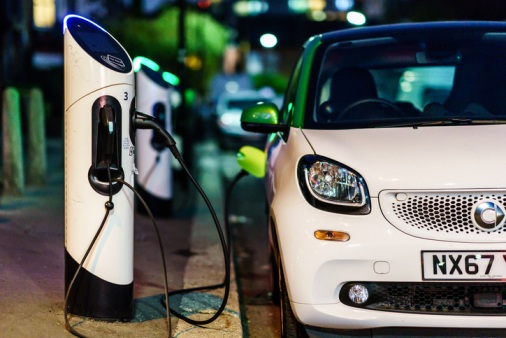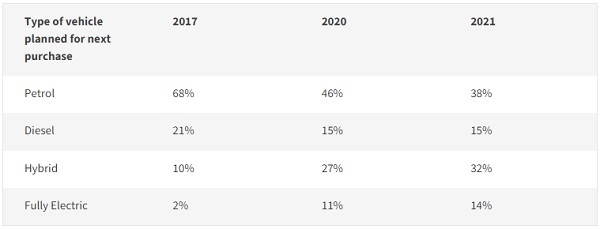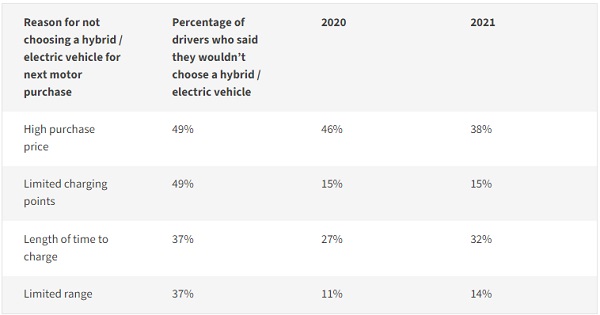Appetite for electric and hybrid vehicles accelerated through the pandemic

- 33% of motorists planning to buy a hybrid or electric model as their next vehicle say the Covid outbreak has had a bearing on their decision
- 18% of motorists say they won’t be driving as much in the future
- 52% of UK adults say the global pandemic has made them more environmentally conscious
- BUT price and limited charging points remain stumbling blocks for more motorists adopting a hybrid or electric vehicle for their next car
The coronavirus pandemic has driven a fundamental shift in motorists’ attitudes towards driving and their choice of vehicle, according to research by Aviva.
The leading insurer has tracked UK motorists’ attitudes towards electric vehicles (EVs) over a number of years and the appetite for more environmentally friendly models has grown considerably in the past 18 months.
In July 2017, an Aviva survey of UK drivers found that 10% expected to buy a hybrid model as their next vehicle and just 2% planned to buy a fully electric vehicle. When a similar study was carried out in July 2020, the propensity to purchase a hybrid model had increased dramatically to 27%, with a further 11% saying their next car would be a fully electric vehicle.
And over the last year, the desire for hybrid and electric vehicles has intensified further, with almost half of UK drivers (46%) saying their next vehicle will be at least partly powered by electricity. Aviva’s latest research finds that one in three UK motorists (32%) intend to opt for a hybrid model as their next purchase, and 14% plan to buy a fully electric vehicle, also known as a battery electric vehicle (BEV).

The shift in consumer attitudes is borne out by August figures from the Society of Motor Manufacturers (SMMT), which show that new BEV registrations are up 107% year-to-date, and EV market share is 8.4%, up 71% over 2020.
What is influencing drivers’ purchasing decisions?
The inclination towards electric and hybrid choices is perhaps unsurprising, particularly given that new diesel and petrol cars will be banned from 2030, with hybrids set to follow in 2035.
But Aviva’s research suggests the Covid pandemic has had an impact, too. A third of motorists planning to buy a hybrid or electric model as their next vehicle say the Covid outbreak has had a bearing on their decision. Reasons appear to be both practical and environmental.
Amongst those planning to buy a hybrid or electric model for their next vehicle, one in five (18%) say they won’t be driving as much in the future, while 6% say their household doesn’t need as many cars, and so they plan to purchase a ‘greener’ model.
Moreover, 52% of UK adults say the global pandemic has made them more environmentally conscious. Correspondingly, 41% of people choosing an electric or hybrid vehicle, feel this is a better decision for the environment.
Not everyone is ready to go electric
But while the enthusiasm for electric vehicles is growing rapidly, not everyone is quite ready to make the jump. Amongst those who are planning to buy a petrol or diesel model for their next vehicle, there are a number of common concerns.
Of those who say they wouldn’t consider an electric or hybrid vehicle yet, half (49%) say that both the cost of an electric vehicle and limited charging points are holding them back from choosing a hybrid or electric vehicle for their next motor purchase. This is followed by worries about the length of time taken to charge vehicles (37%) and limited range (37%).

When compared to previous Aviva research, the number of people concerned by each of these reasons has fallen marginally over time. However, the numbers are still significant and it is apparent that millions of drivers are yet to be converted to hybrid/electric models.
Could financial incentives pave the way to “greener” roads?
Aviva’s research suggests that more people would be open to the idea of an electric vehicle if greater financial incentives were available. A fifth of drivers who plan to buy a hybrid / electric model as their next purchase say they want to take advantage of the Government grant available on low-emissions vehicles.
Significantly, two-thirds of all drivers say they would be more likely to buy an electric / hybrid vehicle if they were cheaper or subsidised.
Jon Marsh, Strategy & Transformation Director, Personal Lines, Aviva, said, “Our research shows the appetite for electric and hybrid models is growing rapidly, but many motorists still have concerns and there is work to be done to convince everyone that the benefits outstrip any downsides.
“The pandemic and its resulting lockdowns have naturally affected how people use their vehicles and this is having an impact on people’s purchasing decisions. There is no doubt that the demand for electric and hybrid vehicles has increased and will continue to do so as vehicle costs reduce and infrastructure improves, but it will be interesting to see whether the Covid pandemic speeds up the process as people rethink their mobility needs.”
Top 10 Tips for EV owners:
- When looking at buying an EV, don’t forget to factor in ongoing costs, such as fuel, tax and servicing - which may be cheaper than petrol or diesel equivalents due to low emissions and a ‘clean’ engine. The total cost of ownership may work out to be less.
- Government grants of up to £2,500 are available for new low-emission vehicles. If you are buying a new EV, you do not need to apply for this – the dealer will include the value of the grant in the vehicle’s total price.
- Check that the mileage range on the EV you want to buy is suitable for your needs. Battery technology has advanced since the first generation of EVs hit the market a decade ago; some EVs now claim ranges of more than 300 miles. Older vehicles may not achieve the ‘official’ range in real day-to-day driving conditions.
- There are more than 16,000 charging stations across the UK, with a total of around 44,000 connectors, or charging cables for use. Apps like ZapMap show which chargers are available in your area, and which ones are working. Often your car charger map won’t provide as much detail as an app.
- As with the price of fuel, it’s generally more expensive to charge at a motorway station than at or near your home.
- How many miles you get on a single charge will depend on how you use your EV. Typically, motorway driving is less efficient than city driving, as regular braking charges the battery. For peace of mind, you might consider purchasing breakdown cover which includes a roadside boost for EVs. Aviva offers breakdown cover through the RAC, which can help vehicles without power get moving again with a roadside power boost.
- EVs drive differently to petrol or diesel engines and their acceleration can be a lot quicker. It is worth test driving an EV to understand how it drives.
- Remember that EVs and hybrids are quiet – pedestrians, animals, cyclists and other road users might not hear you coming, especially in car parks.
- Each charging provider will be slightly different – some will let you pay-as-you-go; others will require a subscription and some chargers are free. Make sure you don’t accidently sign up to a charging provider who takes payment on a regular basis if you’re not going to use that charger very often.
- The batteries that power your EV are different than those in your phone or other electrical items: charge ‘little and often’ instead of waiting for the battery to run down and charge it up from zero.
About Aviva
Aviva Insurance Limited is one of the UK’s leading insurance companies, part of the Aviva group with 34 million customers Worldwide. Aviva Insurance has been in the insurance business for more than 300 years.
In UK commercial, the insurance market remains challenging for insurance brokers and customers, due to the ongoing economic conditions. Aviva Insurance are focusing on improving our processes to ensure Aviva provide commercial customers with insurance cover at an acceptable price. Insurance brokers also recognised our excellent customer service by voting us Insurance Times General Insurer of the Year in 2012, for the second year running. youTalk-insurance sharing Aviva insurance news and video.

